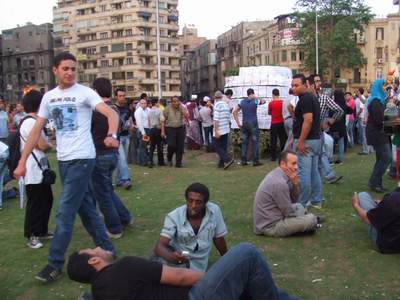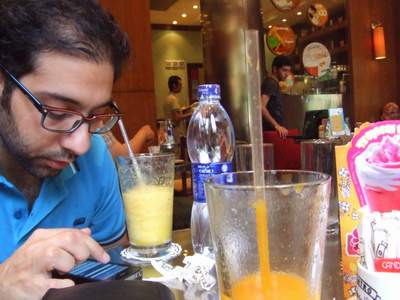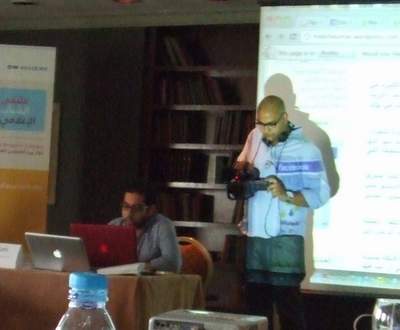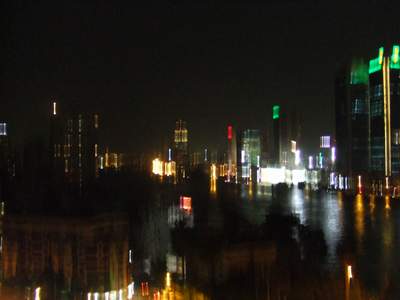I want to be able to say things (also at public events), which will not be published. It is something different if somebody publishes an audio or video recording or a direct transcript of what I said and if people say that I said. In the latter case I can always claim that I was misquoted, in the first cases there is proof I said something. But if there is a danger of everything being quoted and published, then there is a restriction to what can be said in (semi) public and I would consider that a loss to debate culture.
I would like to have a discussion about the ethical limits of social media coverage.
0 Kommentare in: youngmediasummit ... comment ... link
Never move to a place where there are no elevators.
Never move to a place where there is no air conditioning.
Never move to a place where you have to use public transport.
Never move to a place where you get only sandwiches for lunch.
0 Kommentare in: youngmediasummit ... comment ... link
Yesterday I overheard a conversation between two journalists. The first told the second that s/he wanted to interview him/her, but that actually s/he did not need to really interview him/her, because s/he had already written the interview from things s/he had heard him/her saying in different conversations during the summit. So the second journalist only needed to read the interview and see what corrections were needed. And thus the interview was concluded.
But if it is an authorised text, not a transcript of an interview, why frame it as an interview? As a reader I have certain images, what an interview should be. And this production process does not fit with it. I would feel cheated, if I was presented by such an interview. It very much reminded me of the discussions around this years Kisch-Preis in Germany.
0 Kommentare in: youngmediasummit ... comment ... link
Yesterday at our panel discussion asked me where I am from. As far as I remember we were talking German. And I was wearing my Salwar Kamiz from Agra. So I told him first Germany and then "One can see that I am from Germany, can't one?" And he took it quiet well.
PS 28.05.11:The woman at the reception (in the new hotel) asked me where I am from, my name sounded interesting to her. She did not expect me answering Germany, but then without ado shifted to talk German with me, since she is German as well.
0 Kommentare in: youngmediasummit ... comment ... link
0 Kommentare in: youngmediasummit ... comment ... link

I am still sitting in my posh hotel room, taking advantage of the internet, the air conditioning and the safety. Today major protest are planed at Tahrir Square. Everybody is going there. I do not, because I am too illiterate. I know to little about the protest, Cairo and the language. I would hardly understand the things happening. And if it becomes dangerous, I would understand even less and be a burden on anybody taking care of me.
At the moment sitting in my hotel room, I hear a male voice outside. Most probably it is a praying voice, because at the moment it seems to be a religious chant. But it could also be something revolutionary (or something else). I just know too little. And that is why I will stay in a safe place, catering for illiterate people like me.
0 Kommentare in: youngmediasummit ... comment ... link

So drinking a cold drink, not having a smart phone and nothing to read with me, I had much time thinking about the new social media. Why is it that is so important to be always online? Why do you seem to forget the people around you? Don't you talk with each other anymore? Do I need a smart phone to be able to communicate with people?
Once the internet connection was established, my colleague got new information about what happens around us, told us about a blocked road close by. So yes, it makes sense to check the internet, especially in revolutionary times.
And he said he had needed a quiet time. I very much understand that.
Thus (non-)communication is much more complex than it seemed to me on the first glance.
0 Kommentare in: youngmediasummit ... comment ... link
PS: On the last day we have to fill in evaluation sheets. We comment on them not really being anonymous and my neighbour says, one can distinguish male and female handwritting. Looking at my evaluation sheet, he, however, has to admit that mine is not clearly female. Joining in the biologistic argument I argue that my handwritting is not so female because I have a small beard and my hormones are not ok. He seems confused.
0 Kommentare in: youngmediasummit ... comment ... link
There is more to blog about the last day, but it is already far too late in the night. I will do that later.
PS: 01.06.11: Michael's experiences are similar to mine.
0 Kommentare in: youngmediasummit ... comment ... link
I know that this post can be read as a conservative rejection of a new technology. And there might be some truth in this, because it is a technology I do not use. But at the same time I claim that we have to think about when synchronity of reporting makes sense and when maybe it is not so important or even a bad idea. Only because we have a technology we do not have to use it for all purposes and all the time.
And I am still wondering what the tweet of one of the participants that she is hiding her anti-feminism as so many participants are talking about feminism is meant to do. Is it making a statement against feminism for the other participants, who can follow the tweets, and is thus the opposite of hiding? If so, why is there the claim of hiding? I obviously do not get it.
PS 29.11.11: Currently the next Young Media Summit is staged in Tunis. Since I was a participant at the last one and I know some of the participants of the current one, I am interested in what is happening there. Thus I once in a while check their tweets and the Facebook site. Unfortunately, my impression from above, however, gets confirmed. The tweets provide me with totally unsatisfying information. Lots of it is totally uninteresting to me (in particular the advertisment posts in between for yms) and what is interesting is far too brief to get an impression of what is happening. Thus I have still not progressed in understanding why one should tweet from such a conference and why one should read the tweets.
1 Kommentar in: youngmediasummit ... comment ... link

There is a video journalist following out conference. He is there most of the time, standing just in front of the speaker in order to get a good footage, holding his camera next to my head, disturbing a discussion. For me this filming seems very invasive. I am fine that I am filmed, but I do not want the camera and the video journalist to be so dominant. I want to listen and discuss in this group -that is my first priority. For me the filming should be of lower priority. Does film coverage have to be so invasive? Is media coverage more important than the event itself?
0 Kommentare in: youngmediasummit ... comment ... link

I engage with one in a discussion about migrant (domestic) workers (because I am interested in migrants from South Asia to this region) and talk about our privileges and their marginalisations. She gets into a very defensive mode, arguing that the domestic workers are treated well (since they are trusted the kids) and they give wrong accusations about being mistreated by their employers. She adds that she is working hard for her income as well and is not rich. That she can afford a driver, her sister has a domestic servant for her kids, who comes along to London, were they have a flat, etc. just seems normal to them.
Also another claims not to be rich, just comfortable. She drives a good car, has a blackberry, a very upper class habitus and the impression that the poor are less educated and thus more religious/ conservative.
These people are active in supporting the Arab revolutions, women's rights, etc., they are nice people and do good things. But I have a feeling that they do not question their class privileges much (I do that also much too little), that they reproduce classist exclusions and I ask myself, what consequences it has when it is these people who not only raise their voices but are also heard. And what it means that we privileged meet and network. What exclusions are we reproducing together?
2 Kommentare in: youngmediasummit ... comment ... link
I am learning lots and ask lots of questions.
0 Kommentare in: youngmediasummit ... comment ... link
0 Kommentare in: youngmediasummit ... comment ... link

Heute abend bin ich in Kairo zum Young Media Summit angekommen.
Mal sehen, was ich alles zu erzählen haben werde. Gerade habe ich das Gefühl, dass ich erstmal vorallem hinschauen und hinhören sollte - und erstmal gar nicht so viel sagen. Ich lerne dazu.
0 Kommentare in: youngmediasummit ... comment ... link
Soviel zum Thema Gender, Pädagogik und Gewalt. Vorträge alleine reichen nicht, ab und zu braucht es auch praktische Erfahrung.
Und vielen Dank an die Kollegin für die Unterstützung!
2 Kommentare in: heteronormativ ... comment ... link
In dem Beitrag geht es um Privilegien in der Heteronormativität, ähnliche Kommentare wären auch bei einem Beitrag zu Rassismus, Klassismus, Ableism, etc. wahrscheinlich. Wenn Privilegien thematisiert werden und Menschen merken, dass sie vielleicht (auch) privilegiert sind, dann kommt es regelmäßig zu solch platten und wütenden Reaktionen.
1 Kommentar in: privilegien sichern ... comment ... link
Nachtrag 18.05.11: Die taz hat gestern weiter zur Verharmlosung der Vorwürfe beigetragen und ausführlichst über die Spekulationen über Sex-Falle berichtet. Ich finde es richtig, dass die Unschuldsvermutung auch für Strauss-Kahn gelten muss. Ich verstehe aber nicht, warum für die Frau, die ihn wegen versuchter Vergewaltigung angezeigt hat, keine Unschuldsvermutung gilt. Warum erscheint es legitim, sie zu beschuldigen?
Nachtrag 19.05.11: Nach tagelanger Verharmlosung hat die taz heute einen Text von Gabriele Dietze über mächtige Männer und deren Anspruch auf sexuelle Verfügbarkeit von Frauen veröffentlicht. Mein Lieblingssatz:
"Warum benehmen sich dermaßen bedeutende Männer wie Oberaffen, die sich greifen (oder kaufen), was bei "drei" nicht auf den Bäumen ist?"
Nachtrag 20.05.11: Ines Pohl kritisiert in der taz die sprachliche Verniedlichung von sexueller Gewalt und dabei auch explizit deutsche Medien. Eine Selbstreflexion der taz-Berichterstattung fehlt aber und das macht ihre Kritik etwas scheinheilig.
Nachtrag 22.05.11: Die taz hat noch einen verharmlosenden Kommentar veröffentlicht. Ich stimme mit der Autorin Monika Frommel überein, dass für Angeklagte die Unschuldsvermutung gelten muss. Ansonsten stimme ich mit ihr nicht überein, denn sie verharmlost die Gewalt, die eine sexuelle Belästigung (auch ohne vollendeter Vergewaltigung) bedeutet. Sie behauptet, es wäre in irgendeinerweise um Sex gegangen und ignoriert damit völlig die Darstellung der Hotelangestellten. Denn die spricht (soweit ich die Medien verstehe) nicht von Sex sondern von Gewalt (sexualisierter). Aber meine Kritik wird Frommel wohl nur bestätigen, sie schreibt:
"Eine beschämende öffentliche Demütigung ändert kein patriarchales Strukturproblem. Sie fügt einem bis zu diesem Ritual mächtigen und nun äußerst verletzbaren Menschen Schaden zu. Feminismus ist eine breite soziale Bewegung und kann auf eine differenzierte Theorie zurückblicken. Diese Theorie analysiert Machtstrukturen und entwickelt Gegenstrategien. Sie sollte besonders vorsichtig sein, wenn Macht unfair ausgespielt wird. Ignoriert sie diesen Unterschied, wird sie zum feministisch getarnten Faschismus (oder Bolschewismus). "
Genau auf Basis der gesellschaftlichen Machtverhältnisse argumentiertend, würde ich anders argumentieren: Sexualisierte Gewalt gegen Frauen ist gesellschaftlich legitimiert (siehe Kommentar von Dietze). Männer werden dafür selten bestraft und häufig belohnt. Bei öffentlichen Personen braucht es deshalb auch eine öffentliche Debatte über sexualisierte Gewalt. Und zwar in der Form wie Dietze und Pohl es machen. Denn sie urteilen nicht darüber, ob Strauss-Kahn dieses Verbrechen begangen hat, sondern sprechen über das gesellschaftliche Phänomen.
2 Kommentare in: heteronormativ ... comment ... link
 Foto: © Anke Illing
Foto: © Anke Illing


